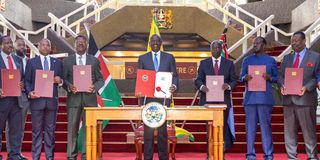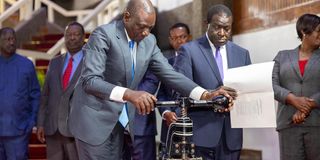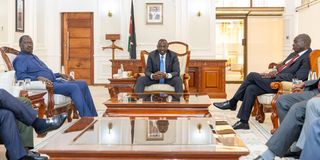Premium
Ruto assents to IEBC Bill, paves way for hiring of commissioners

President Ruto (centre) displays a copy of the new IEBC law on July 9, 2024 at the KICC. With him are (from left): Kalonzo Musyoka (Wiper), Amason Kingi (Senate Speaker), Moses Wetangula (National Assembly Speaker), Rigathi Gachagua (Deputy President), Raila Odinga (ODM) and Prime CS Musalia Mudavadi.
What you need to know:
The assent paves way for the appointment of the selection panel that will recruit the electoral body’s new commissioners.
- Nadco was established following a truce between President Ruto and Mr Odinga.
President William Ruto has signed the Independent Electoral and Boundaries Commission (Amendment) Bill, 2024 into law.
Dr Ruto assented to the bill on Tuesday at the Kenyatta International Convention Centre in Nairobi in the presence of opposition leaders Raila Odinga (Orange Democratic Movement), Kalonzo Musyoka (Wiper Party), Deputy President Rigathi Gachagua and leaders of the two houses of Parliament.
The assent paves way for the appointment of the selection panel that will recruit the electoral body’s new commissioners.
“The assent to the IEBC amendment bill marks a significant step in the actualisation of one of the recommendations of NADCO and the signing of this bill paves way for the establishment of a selection panel for the appointment of IEBC Commissioners,” said Dr Ruto.
“The IEBC remains a cornerstone of our democracy responsible for overseeing regular elections at various levels ensuring that our electoral cycle is managed transparently and administered in an impartial neutral, efficient, accurate and accountable manner."
Under the new law, the number of members of the selection panel has been increased from seven to nine to accommodate a wide spectrum of stakeholders and interest groups.
New provisions
Individuals seeking to be IEBC commissioners will be required to possess proven knowledge and at least ten years’ experience.
Additionally, experience in accounting or information and communication technology have been added as part of the professional qualifications for appointment as a member of the commission.
The Act also increases the term of the secretary to the commission from the current period of three years, renewable once, to a term of four years, renewable once.
“This change ensures continuity in the operations of the commission. The Bill, further, saves the unexpired term of the current holder of the position,” states the brief on the bill.
State House spokesperson Hussein Mohamed on Monday said the IEBC bill was the first to be processed by Parliament based on the recommendations of the National Dialogue Committee (Nadco) report.

President Ruto puts the public seal on a copy of the new IEBC law.
The report was a product of a bi-partisan team, consisting of leaders from President Ruto’s Kenya Kwanza and Mr Odinga’s Azimio la Umoja One Kenya Coalition.
The Head of State urged Parliament to expedite other recommendations in the Nadco report to process various bills that were recommended by the committee.
The IEBC bill was one of the thorny issues that dominated debate during the recent anti-government protests, as the youth demanded the establishment of the electoral commission to prepare for the 2027 General Election.
Mr Odinga said the prevailing situation in the country, marked by citizen demands for overhaul of governance, required leaders to provide direction on how Kenya moves forward.
He said the newly signed IEBC law would bring change at the commission, whose operations had been crippled by the lack of a chairman and commissioners.

President Ruto held talks with the opposition leaders before the signing ceremony.
He added that addressing the issues raised by citizens could help end the ongoing protests, and asked the president to hold talks with all stakeholders.
"This bill that has been signed into law today is just one of those issues...most of the issues that are being raised by the youth are addressed in the Nadco report," Mr Odinga said.
"I think that Kenya deserves better. The issue of employment, issues of discrimination, issues of corruption, issues of gender discrimination and so on need to be addressed."
National Assembly Majority Leader Kimani Ichung'wa, who was the chair of Nadco, said that the adoption of IEBC bill showed the importance of dialogue in the country.
Mr Ichung'wa also said that the other bills that emanated from the dialogue would be given the first priority when the House resumes sitting later this month.

Mr Odinga speaks after the signing ceremony at the KICC.
Mr Musyoka, who was the co-chair of the committee, said that they joined the government in dialogue because Kenyans raised concerns after the 2022 election, including alleged rigging.
Mr Musyoka also urged the government to give the youth full attention and address the issues that they raised.
"I want to urge that we look at our country afresh. There's no way that we can wish away the Gen Zs revolution," Mr Kalonzo said.
Citing the many roadblocks he had to cross before getting to KICC, he also asked the president to remove the military from the streets.





